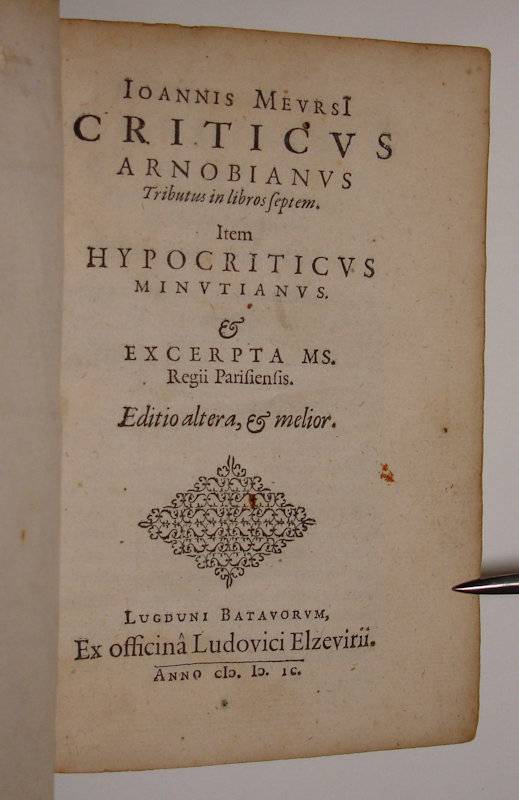ARNOBIUS.- MEURSIUS,J.
Ioannis Meursii Criticus Arnobianus tributus in libros septem. Item Hypocriticus Minutianus, & Excerpta MS. Regii Parisiensis. Editio altera, & melior.
Leiden (Lugduni Batavorum), Ex officina Ludovici Elzevirii, 1599.
8vo. (XX),167,(23)(1 blank) Vellum 16 cm (
Ref: Dibdin 1,215: 'an indispensable work to peruse, for those who are curious in the learning of the author'; Willems 44; Rahir 26; Berghman 1283; Schoenemann 1,166/67) (
Details: 5 thongs laced through both joints; colophon at the end: 'Lugduni Batavorum, Excudebat Ioannes Balduini. Anno 1599, mense Julio') (
Condition: Short title in ink on the back; vellum somewhat soiled; 2 hardly noticeable pinpoint wormholes in the first 6 leaves; some foxing; name on front flyleaf erased, leaving a small hole) (
Note: Arnobius, a teacher of rhetoric at Sicca Veneria in Numidia 'was suddenly converted to Christianity (ca. A.D. 295) and a year or 2 later, at the instance of his bishop, wrote seven books 'Adversus Nationes', Against the Pagans. His work throws light on the Christian-pagan debate immediately before the Great Persecution, while the venom of his attack on traditional Roman paganism shows that this was by no means dead'. (OCD 2nd edition p. 122) His style is easy-flowing. Arnobius makes little use of the New, and none of the Old Testament. His view of God is platonic. The unintended side effect of the efforts Arnobius and other Church Fathers to ridicule or crush paganism, was that their writings form an archive which preserves knowledge and practices of polytheism in the years of its decline in late antiquity. Just as the early christians bolstered their piety by contrasting it with the demonic foulness of pagan religion, so the protestants of the 16th century used their knowledge of pagan idolatry to scourge their catholic adversaries. Critics of Catholicism, like Calvin, compared catholic mass e.g. with the bloody rituals of the pagans, and used the sacrifices of the ancients to score theological points against their opponents. 'Protestants detected in the Catholic cult of images, the pagan idols so well described by late antique critics like Arnobius'. (The Classical Tradition, Cambr. Mass., 2010, p. 678, s.v. Paganism) The work of Arnobius was first published in Rome in1542 (although the preface is dated 1543), containing as Book Eight the 'Octavius' of Minucius Felix. Other editions followed in 1546, 1560, 1580, 1582, 1583 & 1586. Joannes Meursius, or in Dutch 'Jan de Meurs', 1579-1639, was only 19 years old when he published the first edition of this celebrated 'Criticus Arnobianus' in Leyden in 1598. He studied under the genius J.J. Scaliger, who helped him to publish it. It was a work of philology and not of theology, and it enjoyed a mixed reception. Schoeneman observes that the book showed indeed the 'acumen' of the author's genius, but that it is more on others classical authors than on Arnobius and Minucius Felix. Meursius offers for the greater part animadversions, critical notes, conjectures and emendations. He did not consult manuscripts, but used his 'ingenium'. The next year, 1599, Elsevier published this second improved edition of the 'Criticus Arnobianus'. It was not 'augmented', as is usual with second editions, on the contrary, Meursius wisely cut a number of his rasher suggestions. In 1610 Meursius became professor of Greek at his own university. There, in Leyden, he produced the 'editiones principes' of a number of Byzantine authors, the 'editio princeps' of the 'Elementa Harmonica' of Aristoxenus (1616), and edited the 'Timaeus' of Plato with the commentary and translation of Chalcidius (1617). He wrote much on the antiquities of Athens and Attica. (J.E. Sandys, 'A history of classical scholarship', 1964, p. 311)) (
Provenance: On the front pastedown in pencil the name of 'J.A. Dijck') (
Collation: +12 (minus leaf +11 & +12), A - M8 (leaf M8 verso blank)(Photographs on request)
Book number: 120114 Euro 600.00
Keywords: (Oude Druk), (Rare Books), Arnobius, Latin literature, Minucius Felix, Paganismus, Spätantike, antike altertum antiquity, early christian literature, early christianity, frühchristliche Literatur, frühes Christentum, late antiquity, paganism, römische Literatur
 ARNOBIUS. MEURSIUS,J.
ARNOBIUS. MEURSIUS,J.